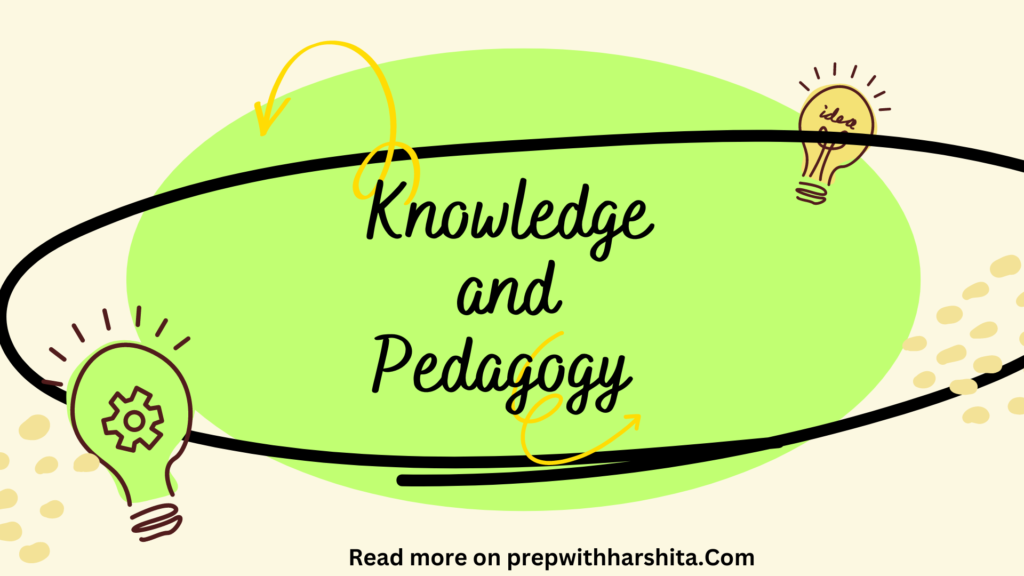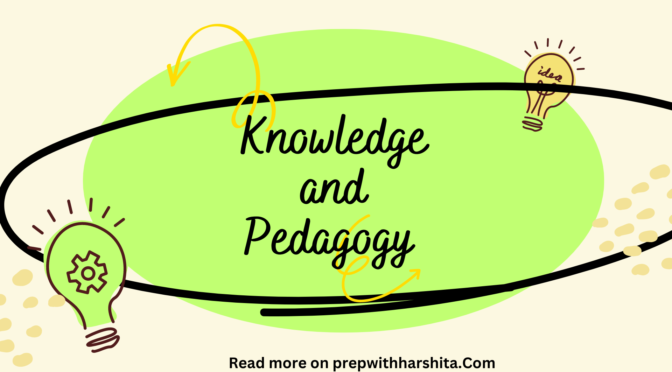Knowledge and pedagogy are two interconnected aspects of education that play vital roles in the teaching and learning process.
Let’s explore each of them in detail:
- Knowledge: Knowledge refers to the information, concepts, theories, facts, and skills acquired through learning and experience. It forms the foundation of education and provides the content that is taught and learned in educational settings.
Here are key aspects of knowledge in education:
a) Content Knowledge: Content knowledge encompasses the subject-specific information and understanding that students acquire in various disciplines, such as mathematics, science, literature, history, and more. It includes both foundational concepts and advanced knowledge within each subject area.
b) Procedural Knowledge: Procedural knowledge involves knowing how to perform specific tasks, procedures, or skills. It includes practical knowledge, techniques, methods, and strategies related to areas such as problem-solving, scientific inquiry, critical thinking, writing, or artistic expression.
c) Declarative Knowledge: Declarative knowledge refers to factual information or knowledge about facts, concepts, principles, and theories. It involves understanding and recalling information, definitions, and explanations within a specific domain.
d) Metacognitive Knowledge: Metacognitive knowledge refers to knowledge about one’s own cognitive processes, learning strategies, and self-regulation. It involves awareness of one’s strengths and weaknesses, understanding how to plan, monitor, and evaluate learning, and applying effective study skills.
e) Contextual and Applied Knowledge: Contextual and applied knowledge involves the ability to apply knowledge and skills in real-world contexts. It emphasizes the practical application of knowledge to solve problems, make informed decisions, and engage in meaningful activities beyond the classroom.
- Pedagogy: Pedagogy refers to the methods, strategies, and approaches employed by teachers to facilitate learning and promote student development. It involves the art and science of teaching, encompassing instructional practices, classroom management, assessment, and the creation of supportive learning environments.
Here are key aspects of pedagogy in education:
a) Instructional Strategies: Pedagogy involves selecting and implementing appropriate instructional strategies to facilitate learning. This includes techniques such as direct instruction, cooperative learning, inquiry-based learning, problem-solving, project-based learning, and differentiated instruction. Effective pedagogy considers students’ needs, learning styles, and engagement to enhance understanding and retention of knowledge.
b) Classroom Management: Classroom management involves establishing a positive and productive learning environment. Effective pedagogy includes strategies for creating routines, setting clear expectations, managing behavior, fostering positive relationships, and ensuring a safe and inclusive classroom climate. A well-managed classroom enables effective teaching and learning to take place.
c) Assessment and Feedback: Pedagogy incorporates various assessment methods to measure student learning and provide feedback. This includes formative assessments (e.g., quizzes, discussions, observations) to monitor progress and adjust instruction and summative assessments (e.g., exams, projects, portfolios) to evaluate learning outcomes. Timely and constructive feedback guides students’ understanding and supports their growth.
d) Technology Integration: Pedagogy embraces the effective integration of technology in education. It involves using technology tools, applications, and digital resources to enhance teaching and learning experiences, promote collaboration, and provide access to information. Pedagogical approaches consider the appropriate use of technology and digital literacy skills necessary for students’ success in a technology-driven world.
e) Differentiated Instruction: Pedagogy recognizes the diverse needs, interests, and abilities of students and embraces differentiated instruction. This approach involves adapting teaching methods, materials, and assessments to accommodate individual learner differences. It promotes inclusive education, addresses diverse learning styles, and supports all students in reaching their full potential.
The effective integration of knowledge and pedagogy is essential for meaningful learning experiences. Teachers must possess a deep understanding of the subject matter (knowledge) and employ effective teaching methods (pedagogy) to engage and guide students in acquiring, applying, and connecting knowledge.
By employing appropriate pedagogical strategies, teachers can facilitate active learning, critical thinking, and the development of lifelong learners.
Also Read: School Education Contemporary Challenges

Also Visit: Prep with Harshita


I keep listening to the rumor talk about receiving boundless online grant applications so I have been looking around for the top site to get one. Could you advise me please, where could i get some?
I am often to blogging and i really appreciate your content. The article has really peaks my interest. I am going to bookmark your site and keep checking for new information.
Thanks a bunch for sharing this with all of us you really understand what you’re speaking about! Bookmarked. Please additionally talk over with my site =). We could have a link alternate agreement among us!
This really answered my problem, thank you!
You are a very clever person!
I like this website because so much utile stuff on here : D.
This site is known as a stroll-via for the entire info you wished about this and didn’t know who to ask. Glimpse here, and also you’ll undoubtedly discover it.
I’d have to examine with you here. Which is not one thing I usually do! I take pleasure in reading a post that may make folks think. Additionally, thanks for permitting me to comment!
whoah this blog is excellent i love reading your articles. Keep up the great paintings! You realize, a lot of people are searching round for this information, you could aid them greatly.
Great – I should definitely pronounce, impressed with your website. I had no trouble navigating through all the tabs and related information ended up being truly simple to do to access. I recently found what I hoped for before you know it in the least. Quite unusual. Is likely to appreciate it for those who add forums or something, website theme . a tones way for your client to communicate. Excellent task.
Excellent post. I was checking constantly this weblog and I’m impressed! Extremely helpful information specifically the closing part 🙂 I care for such information much. I was seeking this certain info for a long time. Thank you and good luck.
After study a few of the blog posts on your website now, and I truly like your way of blogging. I bookmarked it to my bookmark website list and will be checking back soon. Pls check out my web site as well and let me know what you think.
Hello.This article was really fascinating, especially because I was searching for thoughts on this topic last couple of days.
I enjoy looking at and I think this website got some really useful stuff on it! .
Excellent site. Lots of helpful information here. I?¦m sending it to some friends ans also sharing in delicious. And obviously, thank you in your sweat!
I enjoy the efforts you have put in this, thanks for all the great content.